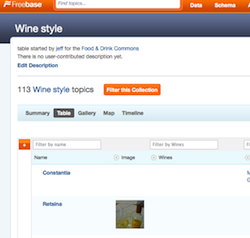I’ve generally taken the train into Manhattan to discover the latest social media startups to come out of our local tech scene. Last week, I serendipitously came upon an intriguing company in my own extended New Jersey neighborhood. Located in Montclair, Bubbalon is a rating website that asks its community to rate the value of restaurants, TV shows, music, movies, politicians, ideas, and just about anything else in this whole wide world.
Sure, it is similar to other sites in this genre. Like Hot Potato, Hunch, and Foodspotting, Bubbalon banks on its members’ social altruism and cognitive surplus. Ratings of friends (as supplied by Facebook) also give users a benchmark on which to gauge judgments and potentially sway decisions. And there’s a Foursquare integration to boot.
Bubbalon, though, separates itself from other social sites in its emphasis on the emotional value assigned to rated objects— in other words, does it make you happy.
I took the bait, and registered as a subscriber. I rated a nearby park, where I spent part of a lazy Sunday afternoon this past weekend, as raising my serotonin levels. What can I say: green parks, lush trees, and reading the Sunday Times in a reclined position brings me joy.
One interesting challenge raised by Bubbalon and other recommendation startups is this, how do you classify the world? There’s a nice connection between ranking sites and another topic I’ve written about recently, the semantic web
Bubbalon was started by entrepreneurs Alex Galkin and Todd Hamilton (who also runs a local meetup called Shift Happens). Their site is currently in beta, and as with other early stage social media I’ve demoed, there’s a local feel to the restaurants, cafes, and shopping that are commented on.
Certainly, a sense of place is important, and for a few minutes I found myself staring at the scrolling feed of real-time Bubbalon rankings, waiting for someone to counter my comments on a favorite local pizza joint I just scored. As Clay Shirky has pointed out, we are inclined to share our expertise and display our competencies, and mine is dispensing rulings on the area’s pizza emporiums.

Bubbalon lets you rank and comment on anything.
Once a social ranking site moves beyond classifying just food or retail shops, they run into the challenge of organizing a universe of diverse information and their related attributes and properties. And as purely practical matter, they’ll want to at least seed some of the categories with content—to get the ball rolling.
So … I made a brief visit at Hunch, a much-hyped and well-funded recommendation site that I find overly complicated, to search a comprehensive list of movie directors, more than I would have expected to have been contributed by the crowd alone.
One way to get all this classification data—and I’m not saying that Hunch has necessarily taken this approach—is through a novel free, open database called, unsurprisingly, Freebase.
It’s a network database ( non-relational) that’s populated using a Wikipedia-style organizational structure of editors and contributors. By the way, all the content is licensed through the Creative Commons. Naturally, there’s a query language to pull out the data objects.
Freebase can provide a granular classification menu for Bubbalon and others in this space. For example, when I went to classify my pizza place, Bubbalon gave me a choice of restaurants, bars, and cafes, which didn’t quite fit my pizza joint.

Freebase can be the category provider for sites.
Just suppose I wanted to tell the Bubbalon world about a Spanish white wine that brings me much contentment, a varietal known as Godello. With a Freebase hookup, Bubbalon could list Spanish whites, perhaps organized by region, which I could then select from. And existing factual information for each grape, as stored in Freebase, could also be displayed along with my comments.
The programming and development work would be minimal—a blessing for cash conscious startups. And the additional attributes that are connected with a Freebase object would be incredibly useful for a site’s suggestion engine.
Enough about Freebase. There are links at the end for you to learn more.
Overall, I think these ranking and recommendation sites, even if they decide to take a local or hyperlocal approach, have a promising future. There are obvious business models that would involve revenue sharing with town merchants.
Or if they want to take a different tack, a Bubbalon could team up with an e-tailer infrastructure player, say TurnTo, which I wrote about recently, providing them with recommendation data.
In any case, I’ll be watching this part of the social media world closely over the next year—should be interesting.
Related articles by Zemanta
- Summer in the City: Shirky, Kind Strangers, and Neat Startups (technoverseblog.com)
- Freebase:Semantic Sandwich for Google (technoverseblog.com)
- Bubbalon (bubbalon.com)
- Freebase
- Hunch
- Turnto
- Shift Happens (meetup.com)



Thanks so much for this excellent writeup! We are so glad you found us! Freebase looks like a very interesting strategic partner and I am definitely checking it out. I’ll be happy to chime with the results.
Glad you found the Freebase information useful! Definitely let us know what you come up with.
–Andy